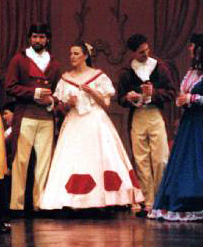Marshall Space Flight Center
I am a solar scientist for NASA's Marshall Space Flight Center, now housed in the National Space Sciences and Technology Center in Huntsville, Alabama. I was born in Atlanta, Georgia, so I've not gotten far from home. I graduated from Georgia State University with a B.S. in physics and earned the M.S. degree (also in physics) from the University of Alabama in Huntsville.
Some of my earliest memories pertaining to astronomy took place on family holidays when we drove at night to Macon, Georgia (about an hour and a half south of Atlanta). We had a 1955 Chevrolet, which was such a large car that I could sleep on the dashboard in the back (this was before the time of children's car seats or even seat belts!). Well sometimes, I would just look at the sky and pester my parents about what stars I was seeing. Of course, my parents didn't know, but I became more determined to learn more about stars, their names, why they were different colors, and how far away they were. When I was about twelve or thirteen, I had the honor and privilege to meet Commander Edgar D. Mitchell. For those of you who don't know, Edgar Mitchell became the sixth man to walk on the Moon. I met the Commander (now a retired Captain) at a patriotic rally in Gainesville, Georgia (north of Atlanta), where I spoke to him personally, asking his advice on becoming an astronaut (a goal I've not attained). At the time, there were no female astronauts, only one female cosmonaut, and NO female fighter pilots (that restriction was only just lifted in 1993), so my career goal seemed a bit far-fetched to most people, but not to Ed Mitchell. I don't know what he actually thought at the time, but what he said was "it will be difficult." He advised me to keep physically fit, take lots of mathematics, and choose a specialty in the sciences that I really enjoyed. Although I decided that I didn't really want to be an astronaut, I followed Edgar Mitchell's advice and am very happy in my profession, solar astronomer.
Although not an astronaut, I'm still an explorer. I frequently explore caves in the north Alabama area and sometimes, I even explore caves under the water. Cave diving is a very, very dangerous sport, but I find the underwater world that I visit is fascinating and enticing. Very few other humans have visited some of the caves. Others are quite popular and see traffic each weekend. But all are very beautiful. I love to watch air bubbles collect on the ceiling, they look like gems. The sweep of the lights on the cave walls illuminates areas that may not have seen light for thousands or millions or years. In some caves, those that flooded long after the caves formed, we see stalactites and stalagmites, just like in dry caves. And because the water is so clear, swimming twenty or thirty feet off the cave bottom almost seems like we're hovering in air.
I like to explore other countries, too. I've visited Germany, France (I even went caving in France), Switzerland, Italy, Romania, Zambia (in Africa), Peru, and Mexico. Peru is one of my favorite places with its beautiful mountains and forests. I hope to visit Guatemala this year and Nepal in 2003.
| |
 |
I'm still following Edgar Mitchell's advice about staying fit. I am a runner and like to run half-marathons. But I'm a dancer, too. When I was in elementary school, I took tap and ballet, but unfortunately stopped when I reached high school. Throughout my twenties and thirties I took dance sporadically, but have been consistent since arriving in Huntsville in 1988. I'm not very good at it mind you, but I do enjoy it and even have an opportunity to perform once or twice a year. I'm really fortunate to have good teachers here, who work us hard, but allow us to have fun with dance.
As for my research, I'm interested in the magnetic fields associated with sunspots. We have an instrument here at Marshall, which can measure the direction and strength of the magnetic field of the spots. If the magnetic field becomes twisted, a sunspot may produce a flare. One of the things we would like to know, is how to predict which sunspots will flare and which flares will produce "coronal mass ejections", gigantic explosions of material which can travel through interplanetary space and affect the Earth through aurora, loss of communication with satellites, and power grid disruptions.
Throughout my life, many of my interests have forced me into situations where I was either the only or one of a few females in a group (physics class, for instance). When I was in high school, this meant that I had few female friends and was often not in the groups with the most popular kids. At the time, this bothered me a great deal. Now however, I enjoy my independence and rejoice in my unique personality. My choices of career have allowed me to do the things I enjoy: the study of the Sun, travel, and the exploration of the Earth. When you make your choices, choose such that YOU are happy.